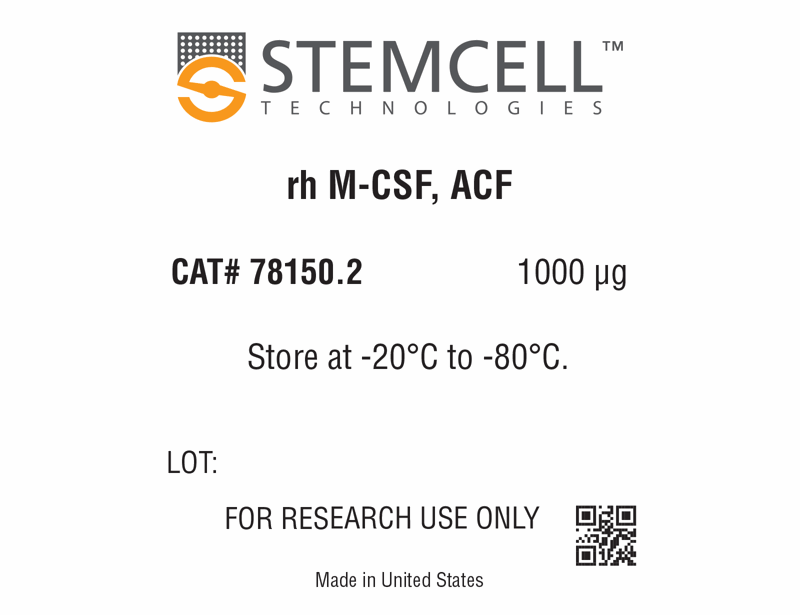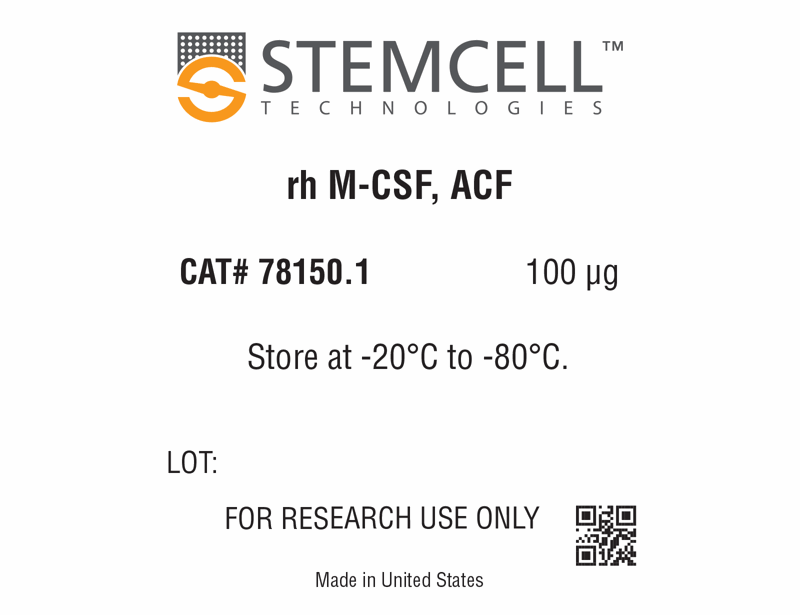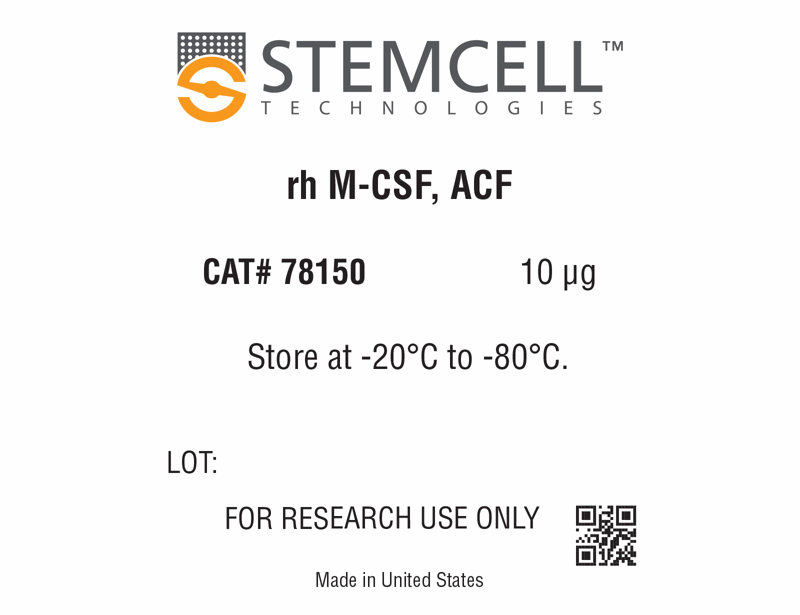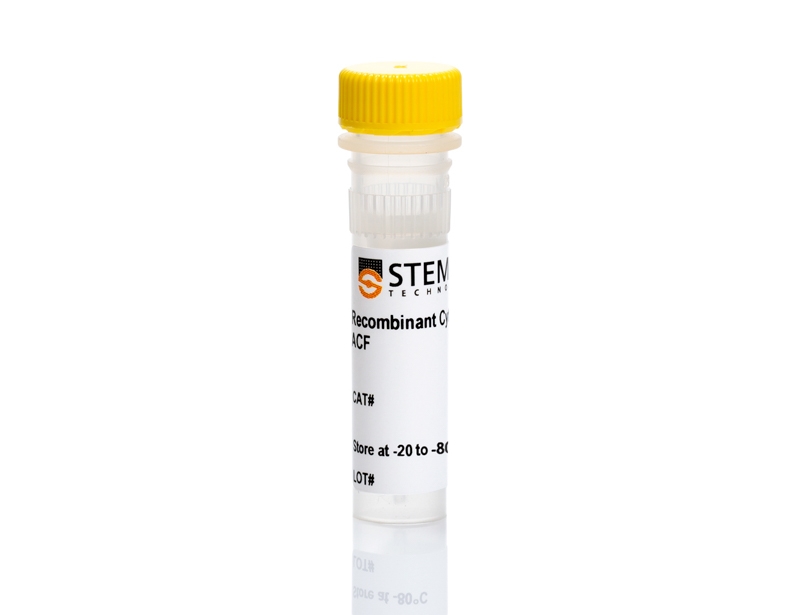Human Recombinant M-CSF, ACF
Macrophage colony-stimulating factor, animal component-free
概要
Macrophage colony-stimulating factor (M-CSF) is a homodimeric glycoprotein growth factor that regulates proliferation and differentiation of myeloid hematopoietic progenitors to mononuclear phagocytic cell lineages, including monocytes, macrophages, and osteoclasts. M-CSF is a crucial factor for the development of tissue-resident macrophages in most tissues (Ginhoux & Jung). It is required for the maturation and activation of monocytes and macrophages, and regulates inflammatory responses in conjunction with other stimuli such as IFN-γ, LPS, and IL-4 (Murray et al.). M-CSF is also required for bone resorption by osteoclasts, and is involved in the development and regulation of placenta, mammary gland, and brain. M-CSF is produced by monocytes, fibroblasts, osteoclasts, stromal cells, endothelial cells, and tumor cells (Chockalingam & Ghosh).
M-CSF exerts its biological effects by signaling through a receptor tyrosine kinase (CSF-1R or M-CSF-R) encoded by the c-fms proto-oncogene (Hamilton). CSF-1R shares similar structural features with other growth factor receptors, including the stem cell factor (SCF) receptor, platelet-derived growth factor receptor (PDGF-R), and Flt3/Flk-2 receptor tyrosine kinase. Stimulation of the CSF-1R upon binding to M-CSF activates MAPK, PI3K, and PLCγ signaling pathways (Chockalingam & Ghosh). Human and mouse M-CSF sequences are highly conserved both at nucleotide and amino acid levels (80% homology; DeLamarter et al.). This product is animal component-free.
M-CSF exerts its biological effects by signaling through a receptor tyrosine kinase (CSF-1R or M-CSF-R) encoded by the c-fms proto-oncogene (Hamilton). CSF-1R shares similar structural features with other growth factor receptors, including the stem cell factor (SCF) receptor, platelet-derived growth factor receptor (PDGF-R), and Flt3/Flk-2 receptor tyrosine kinase. Stimulation of the CSF-1R upon binding to M-CSF activates MAPK, PI3K, and PLCγ signaling pathways (Chockalingam & Ghosh). Human and mouse M-CSF sequences are highly conserved both at nucleotide and amino acid levels (80% homology; DeLamarter et al.). This product is animal component-free.
Subtype
Cytokines
Alternative Names
Colony stimulating factor 1, CSF-1
Cell Type
Dendritic Cells, Hematopoietic Stem and Progenitor Cells, Mesoderm, PSC-Derived, Monocytes, Myeloid Cells, Neurons
Area of Interest
Immunology, Stem Cell Biology
Molecular Weight
18.5 kDa monomer; 37.1 kDa dimer
Purity
≥ 95%
技术资料
| Document Type | 产品名称 | Catalog # | Lot # | 语言 |
|---|---|---|---|---|
| Product Information Sheet | Human Recombinant M-CSF, ACF | 78150, 78150.1, 78150.2 | All | English |
| Safety Data Sheet | Human Recombinant M-CSF, ACF | 78150, 78150.1, 78150.2 | All | English |
数据及文献
Data
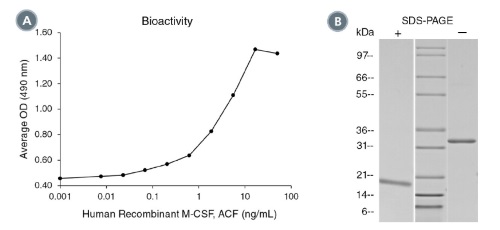
(A) The biological activity of Human Recombinant M-CSF, ACF was tested by its ability to promote the proliferation of NFS-60 cells. Cell proliferation was measured after 62 hours of culture using a fluorometric assay method. The EC50 is defined as the effective concentration of the cytokine at which cell proliferation is at 50% of maximum. The EC50 in the example above is 3 ng/mL. (B) 1 μg of Human Recombinant M-CSF, ACF was resolved with SDS-PAGE under reducing (+) and non-reducing (-) conditions and visualized by Coomassie Blue staining.

